Brexit Economic Impacts Analysis
VerifiedAdded on 2020/05/11
|18
|3783
|146
AI Summary
This assignment requires students to critically evaluate the economic impacts of Brexit. Students must analyze a variety of academic articles, reports, and news sources provided in the document. The analysis should consider various aspects of the UK economy, such as trade, living standards, financial obligations, and GDP forecasts, in light of Brexit. Students are expected to synthesize information from different sources and present a well-structured argument about the economic consequences of Brexit.
Contribute Materials
Your contribution can guide someone’s learning journey. Share your
documents today.
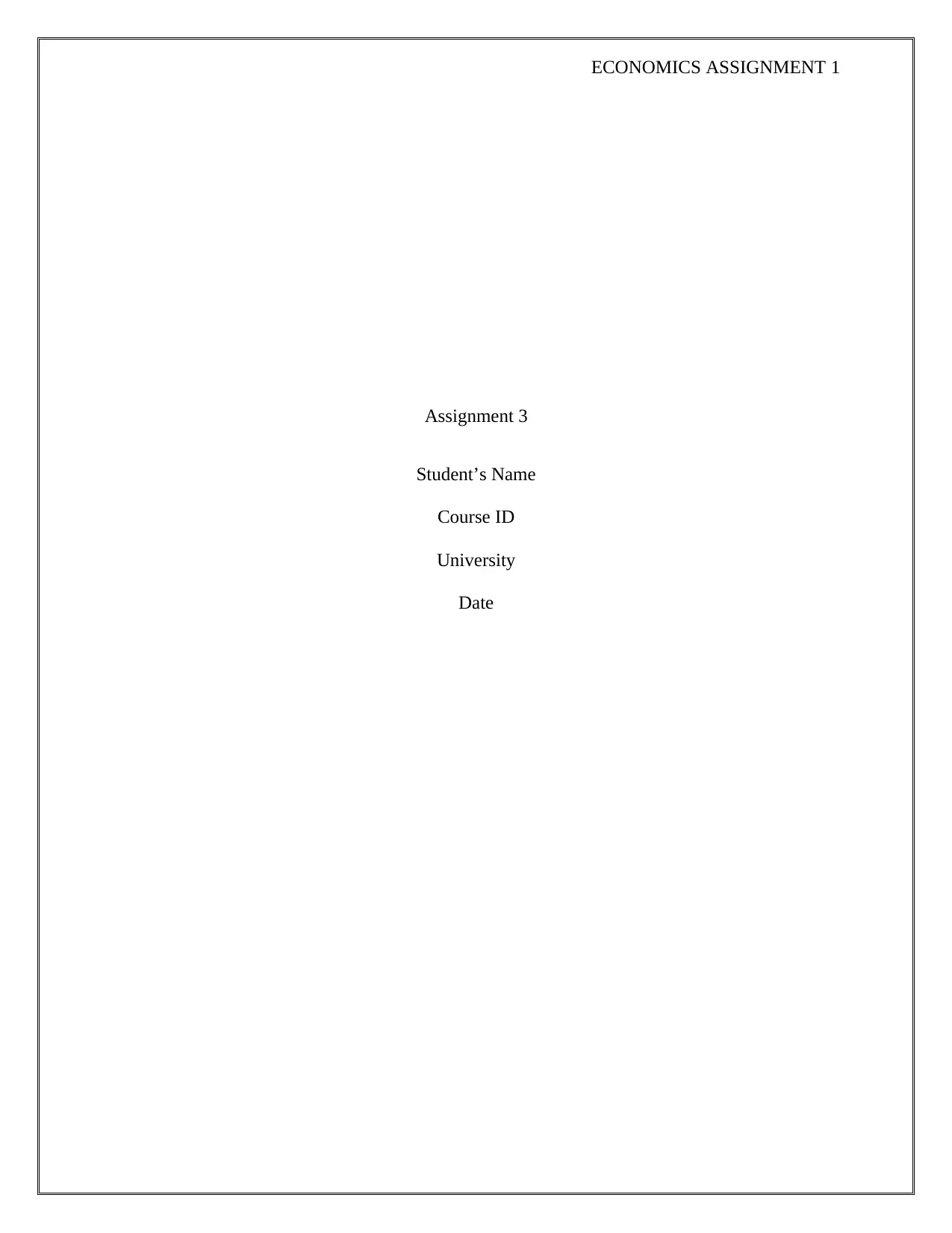
ECONOMICS ASSIGNMENT 1
Assignment 3
Student’s Name
Course ID
University
Date
Assignment 3
Student’s Name
Course ID
University
Date
Secure Best Marks with AI Grader
Need help grading? Try our AI Grader for instant feedback on your assignments.
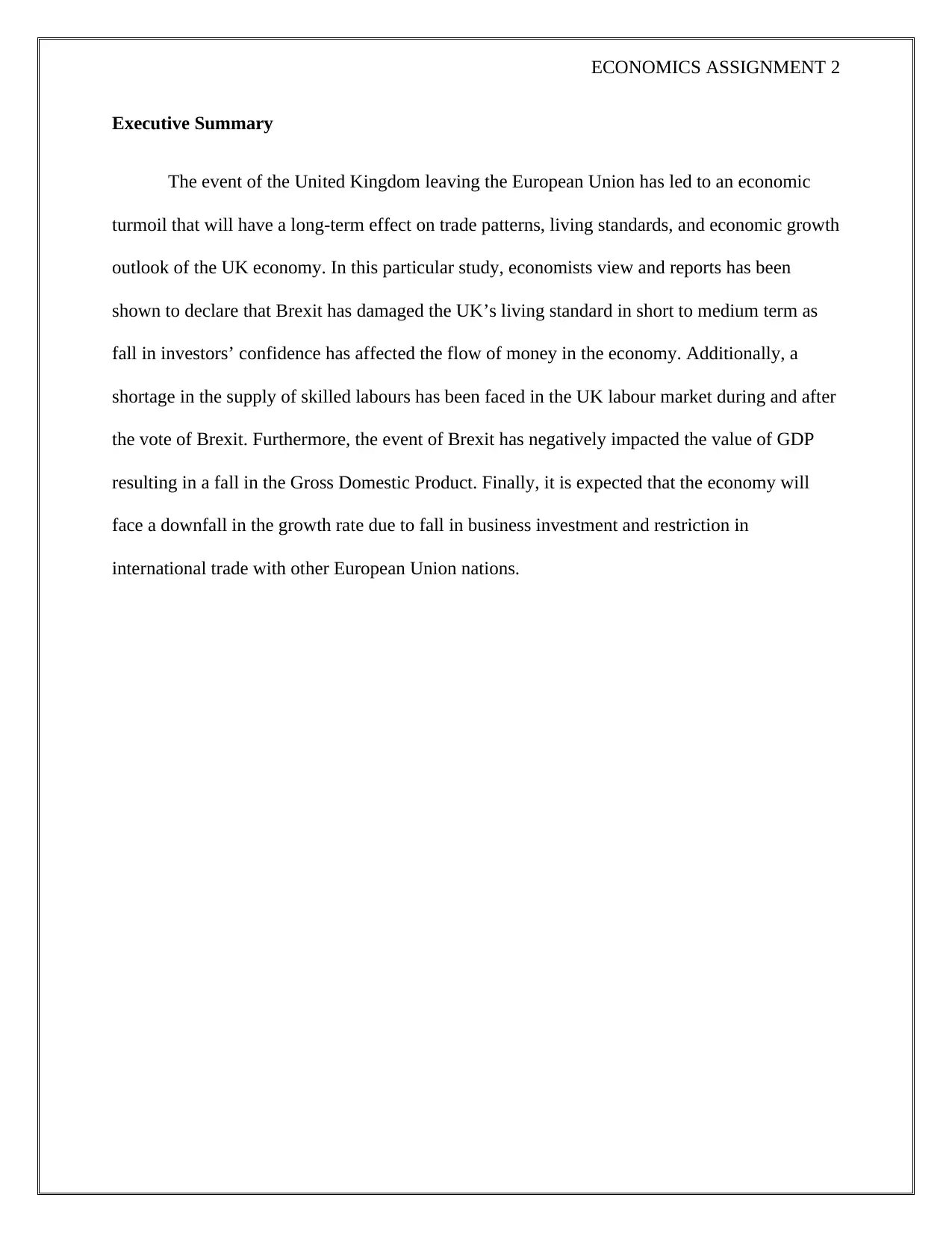
ECONOMICS ASSIGNMENT 2
Executive Summary
The event of the United Kingdom leaving the European Union has led to an economic
turmoil that will have a long-term effect on trade patterns, living standards, and economic growth
outlook of the UK economy. In this particular study, economists view and reports has been
shown to declare that Brexit has damaged the UK’s living standard in short to medium term as
fall in investors’ confidence has affected the flow of money in the economy. Additionally, a
shortage in the supply of skilled labours has been faced in the UK labour market during and after
the vote of Brexit. Furthermore, the event of Brexit has negatively impacted the value of GDP
resulting in a fall in the Gross Domestic Product. Finally, it is expected that the economy will
face a downfall in the growth rate due to fall in business investment and restriction in
international trade with other European Union nations.
Executive Summary
The event of the United Kingdom leaving the European Union has led to an economic
turmoil that will have a long-term effect on trade patterns, living standards, and economic growth
outlook of the UK economy. In this particular study, economists view and reports has been
shown to declare that Brexit has damaged the UK’s living standard in short to medium term as
fall in investors’ confidence has affected the flow of money in the economy. Additionally, a
shortage in the supply of skilled labours has been faced in the UK labour market during and after
the vote of Brexit. Furthermore, the event of Brexit has negatively impacted the value of GDP
resulting in a fall in the Gross Domestic Product. Finally, it is expected that the economy will
face a downfall in the growth rate due to fall in business investment and restriction in
international trade with other European Union nations.
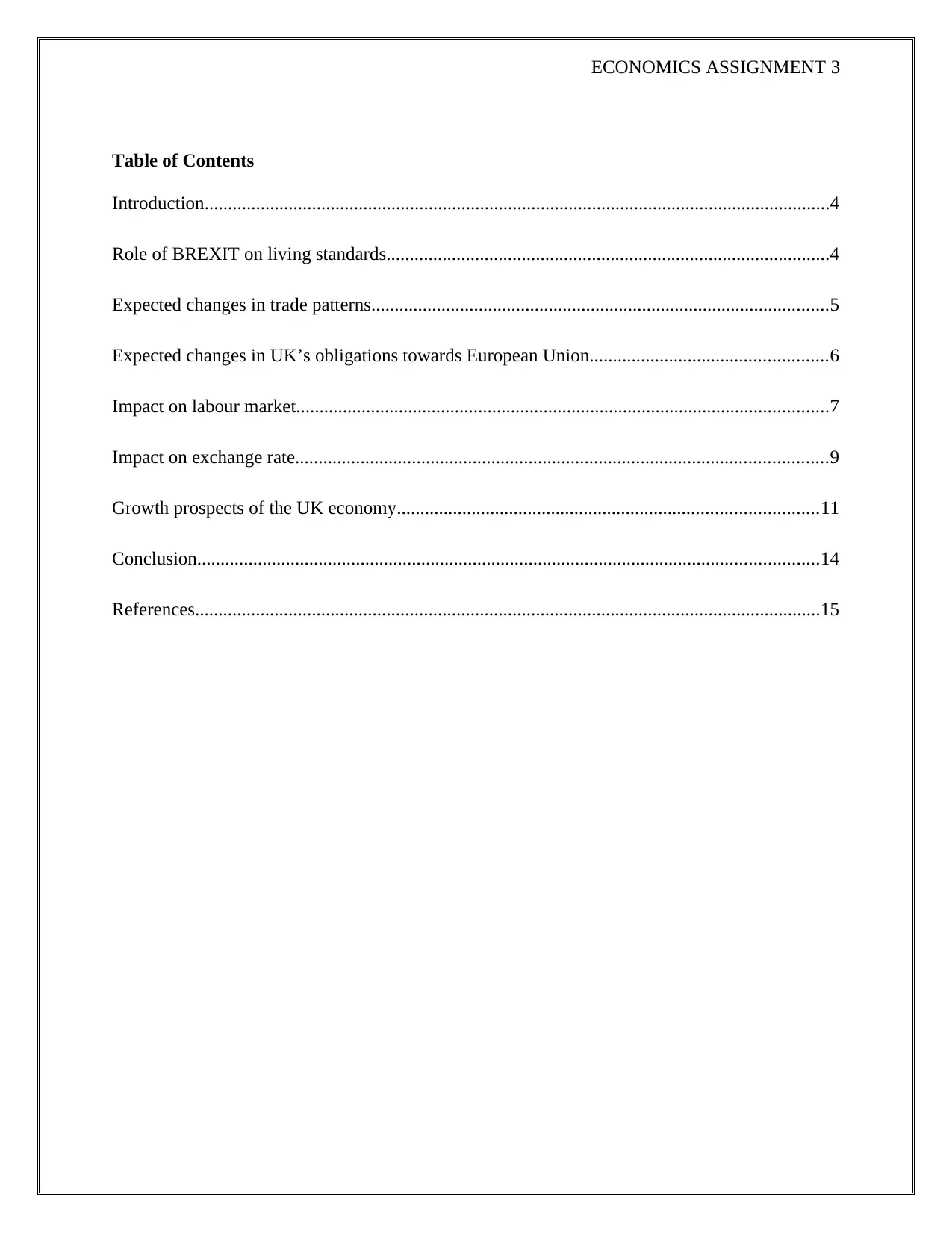
ECONOMICS ASSIGNMENT 3
Table of Contents
Introduction......................................................................................................................................4
Role of BREXIT on living standards...............................................................................................4
Expected changes in trade patterns..................................................................................................5
Expected changes in UK’s obligations towards European Union...................................................6
Impact on labour market..................................................................................................................7
Impact on exchange rate..................................................................................................................9
Growth prospects of the UK economy..........................................................................................11
Conclusion.....................................................................................................................................14
References......................................................................................................................................15
Table of Contents
Introduction......................................................................................................................................4
Role of BREXIT on living standards...............................................................................................4
Expected changes in trade patterns..................................................................................................5
Expected changes in UK’s obligations towards European Union...................................................6
Impact on labour market..................................................................................................................7
Impact on exchange rate..................................................................................................................9
Growth prospects of the UK economy..........................................................................................11
Conclusion.....................................................................................................................................14
References......................................................................................................................................15
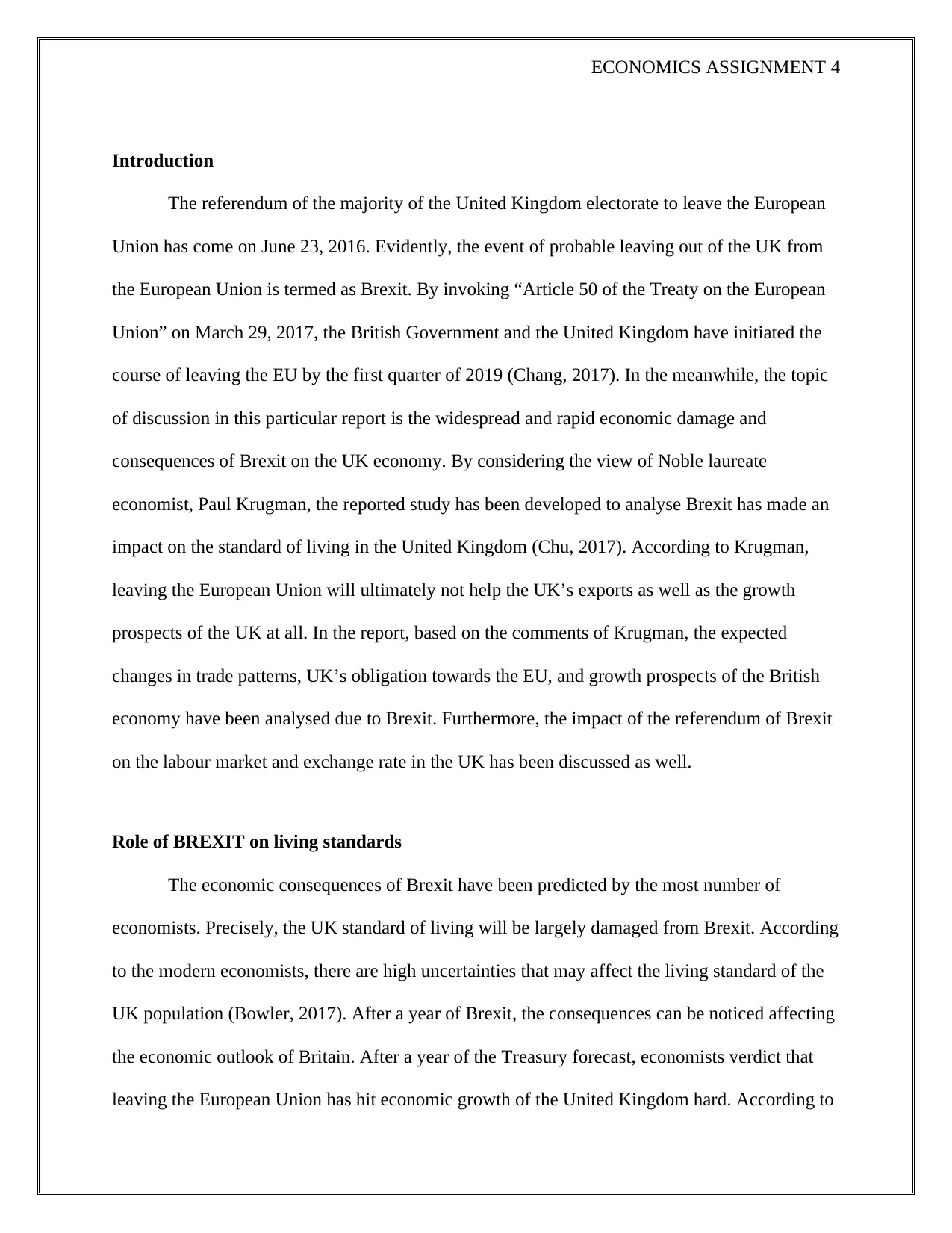
ECONOMICS ASSIGNMENT 4
Introduction
The referendum of the majority of the United Kingdom electorate to leave the European
Union has come on June 23, 2016. Evidently, the event of probable leaving out of the UK from
the European Union is termed as Brexit. By invoking “Article 50 of the Treaty on the European
Union” on March 29, 2017, the British Government and the United Kingdom have initiated the
course of leaving the EU by the first quarter of 2019 (Chang, 2017). In the meanwhile, the topic
of discussion in this particular report is the widespread and rapid economic damage and
consequences of Brexit on the UK economy. By considering the view of Noble laureate
economist, Paul Krugman, the reported study has been developed to analyse Brexit has made an
impact on the standard of living in the United Kingdom (Chu, 2017). According to Krugman,
leaving the European Union will ultimately not help the UK’s exports as well as the growth
prospects of the UK at all. In the report, based on the comments of Krugman, the expected
changes in trade patterns, UK’s obligation towards the EU, and growth prospects of the British
economy have been analysed due to Brexit. Furthermore, the impact of the referendum of Brexit
on the labour market and exchange rate in the UK has been discussed as well.
Role of BREXIT on living standards
The economic consequences of Brexit have been predicted by the most number of
economists. Precisely, the UK standard of living will be largely damaged from Brexit. According
to the modern economists, there are high uncertainties that may affect the living standard of the
UK population (Bowler, 2017). After a year of Brexit, the consequences can be noticed affecting
the economic outlook of Britain. After a year of the Treasury forecast, economists verdict that
leaving the European Union has hit economic growth of the United Kingdom hard. According to
Introduction
The referendum of the majority of the United Kingdom electorate to leave the European
Union has come on June 23, 2016. Evidently, the event of probable leaving out of the UK from
the European Union is termed as Brexit. By invoking “Article 50 of the Treaty on the European
Union” on March 29, 2017, the British Government and the United Kingdom have initiated the
course of leaving the EU by the first quarter of 2019 (Chang, 2017). In the meanwhile, the topic
of discussion in this particular report is the widespread and rapid economic damage and
consequences of Brexit on the UK economy. By considering the view of Noble laureate
economist, Paul Krugman, the reported study has been developed to analyse Brexit has made an
impact on the standard of living in the United Kingdom (Chu, 2017). According to Krugman,
leaving the European Union will ultimately not help the UK’s exports as well as the growth
prospects of the UK at all. In the report, based on the comments of Krugman, the expected
changes in trade patterns, UK’s obligation towards the EU, and growth prospects of the British
economy have been analysed due to Brexit. Furthermore, the impact of the referendum of Brexit
on the labour market and exchange rate in the UK has been discussed as well.
Role of BREXIT on living standards
The economic consequences of Brexit have been predicted by the most number of
economists. Precisely, the UK standard of living will be largely damaged from Brexit. According
to the modern economists, there are high uncertainties that may affect the living standard of the
UK population (Bowler, 2017). After a year of Brexit, the consequences can be noticed affecting
the economic outlook of Britain. After a year of the Treasury forecast, economists verdict that
leaving the European Union has hit economic growth of the United Kingdom hard. According to
Secure Best Marks with AI Grader
Need help grading? Try our AI Grader for instant feedback on your assignments.
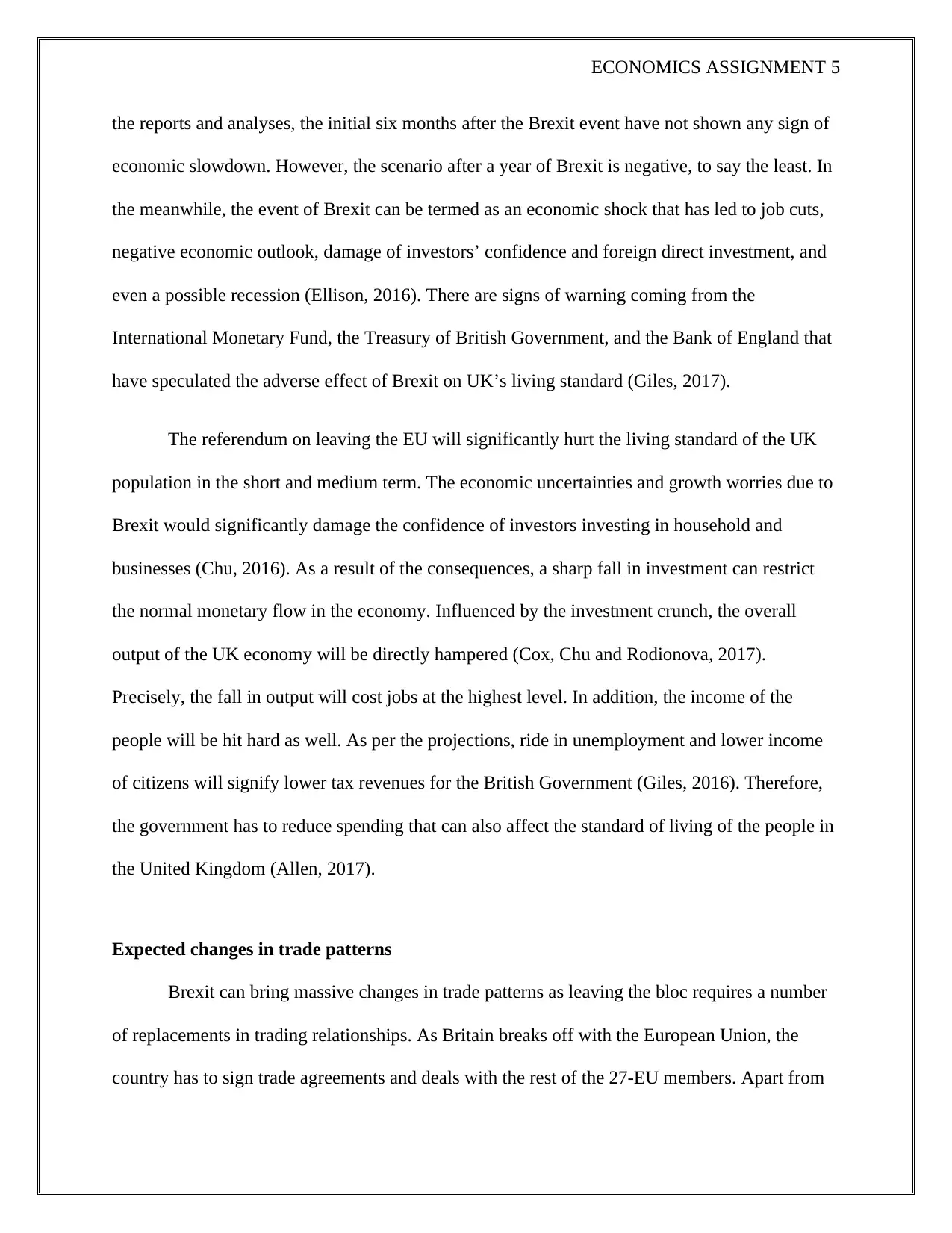
ECONOMICS ASSIGNMENT 5
the reports and analyses, the initial six months after the Brexit event have not shown any sign of
economic slowdown. However, the scenario after a year of Brexit is negative, to say the least. In
the meanwhile, the event of Brexit can be termed as an economic shock that has led to job cuts,
negative economic outlook, damage of investors’ confidence and foreign direct investment, and
even a possible recession (Ellison, 2016). There are signs of warning coming from the
International Monetary Fund, the Treasury of British Government, and the Bank of England that
have speculated the adverse effect of Brexit on UK’s living standard (Giles, 2017).
The referendum on leaving the EU will significantly hurt the living standard of the UK
population in the short and medium term. The economic uncertainties and growth worries due to
Brexit would significantly damage the confidence of investors investing in household and
businesses (Chu, 2016). As a result of the consequences, a sharp fall in investment can restrict
the normal monetary flow in the economy. Influenced by the investment crunch, the overall
output of the UK economy will be directly hampered (Cox, Chu and Rodionova, 2017).
Precisely, the fall in output will cost jobs at the highest level. In addition, the income of the
people will be hit hard as well. As per the projections, ride in unemployment and lower income
of citizens will signify lower tax revenues for the British Government (Giles, 2016). Therefore,
the government has to reduce spending that can also affect the standard of living of the people in
the United Kingdom (Allen, 2017).
Expected changes in trade patterns
Brexit can bring massive changes in trade patterns as leaving the bloc requires a number
of replacements in trading relationships. As Britain breaks off with the European Union, the
country has to sign trade agreements and deals with the rest of the 27-EU members. Apart from
the reports and analyses, the initial six months after the Brexit event have not shown any sign of
economic slowdown. However, the scenario after a year of Brexit is negative, to say the least. In
the meanwhile, the event of Brexit can be termed as an economic shock that has led to job cuts,
negative economic outlook, damage of investors’ confidence and foreign direct investment, and
even a possible recession (Ellison, 2016). There are signs of warning coming from the
International Monetary Fund, the Treasury of British Government, and the Bank of England that
have speculated the adverse effect of Brexit on UK’s living standard (Giles, 2017).
The referendum on leaving the EU will significantly hurt the living standard of the UK
population in the short and medium term. The economic uncertainties and growth worries due to
Brexit would significantly damage the confidence of investors investing in household and
businesses (Chu, 2016). As a result of the consequences, a sharp fall in investment can restrict
the normal monetary flow in the economy. Influenced by the investment crunch, the overall
output of the UK economy will be directly hampered (Cox, Chu and Rodionova, 2017).
Precisely, the fall in output will cost jobs at the highest level. In addition, the income of the
people will be hit hard as well. As per the projections, ride in unemployment and lower income
of citizens will signify lower tax revenues for the British Government (Giles, 2016). Therefore,
the government has to reduce spending that can also affect the standard of living of the people in
the United Kingdom (Allen, 2017).
Expected changes in trade patterns
Brexit can bring massive changes in trade patterns as leaving the bloc requires a number
of replacements in trading relationships. As Britain breaks off with the European Union, the
country has to sign trade agreements and deals with the rest of the 27-EU members. Apart from
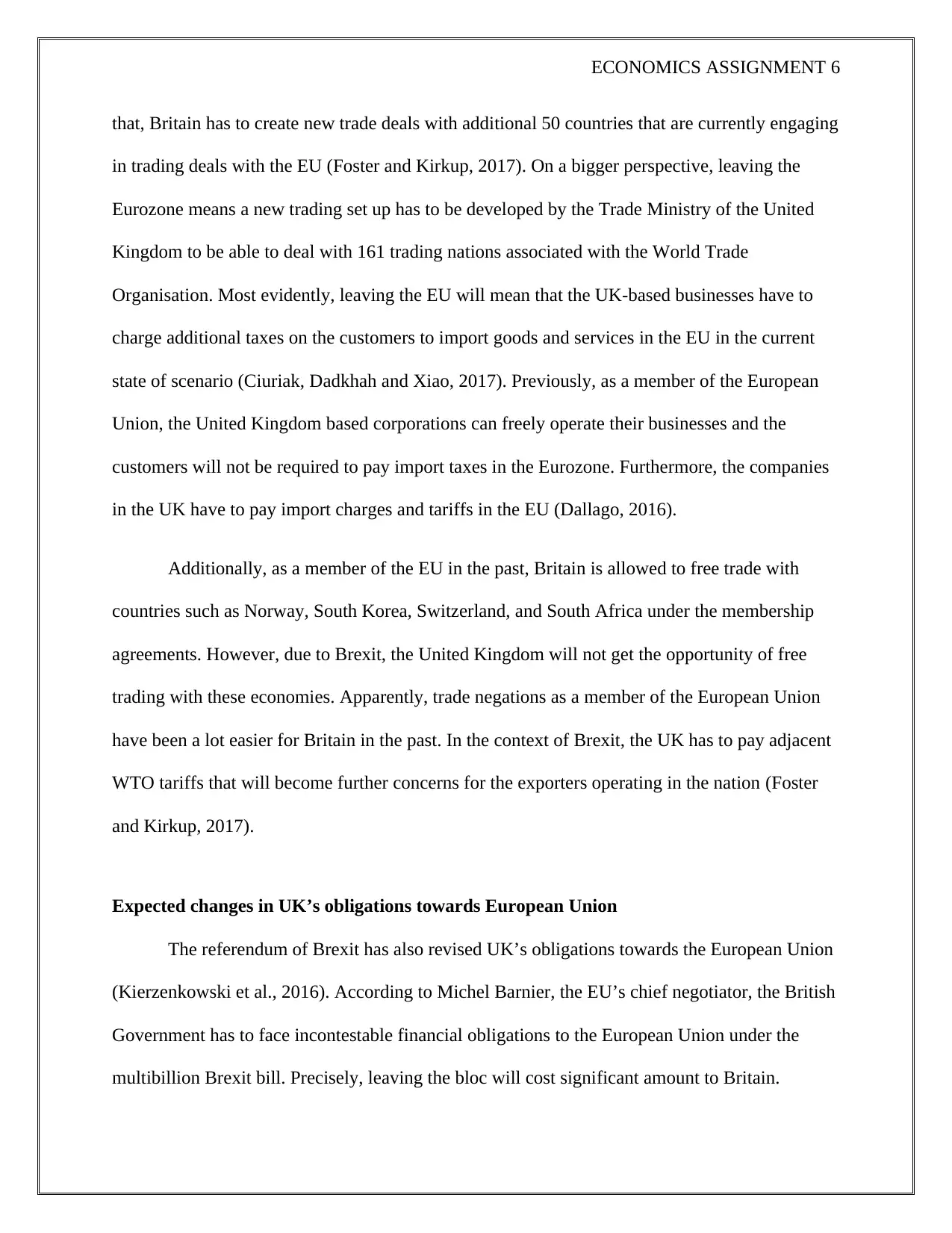
ECONOMICS ASSIGNMENT 6
that, Britain has to create new trade deals with additional 50 countries that are currently engaging
in trading deals with the EU (Foster and Kirkup, 2017). On a bigger perspective, leaving the
Eurozone means a new trading set up has to be developed by the Trade Ministry of the United
Kingdom to be able to deal with 161 trading nations associated with the World Trade
Organisation. Most evidently, leaving the EU will mean that the UK-based businesses have to
charge additional taxes on the customers to import goods and services in the EU in the current
state of scenario (Ciuriak, Dadkhah and Xiao, 2017). Previously, as a member of the European
Union, the United Kingdom based corporations can freely operate their businesses and the
customers will not be required to pay import taxes in the Eurozone. Furthermore, the companies
in the UK have to pay import charges and tariffs in the EU (Dallago, 2016).
Additionally, as a member of the EU in the past, Britain is allowed to free trade with
countries such as Norway, South Korea, Switzerland, and South Africa under the membership
agreements. However, due to Brexit, the United Kingdom will not get the opportunity of free
trading with these economies. Apparently, trade negations as a member of the European Union
have been a lot easier for Britain in the past. In the context of Brexit, the UK has to pay adjacent
WTO tariffs that will become further concerns for the exporters operating in the nation (Foster
and Kirkup, 2017).
Expected changes in UK’s obligations towards European Union
The referendum of Brexit has also revised UK’s obligations towards the European Union
(Kierzenkowski et al., 2016). According to Michel Barnier, the EU’s chief negotiator, the British
Government has to face incontestable financial obligations to the European Union under the
multibillion Brexit bill. Precisely, leaving the bloc will cost significant amount to Britain.
that, Britain has to create new trade deals with additional 50 countries that are currently engaging
in trading deals with the EU (Foster and Kirkup, 2017). On a bigger perspective, leaving the
Eurozone means a new trading set up has to be developed by the Trade Ministry of the United
Kingdom to be able to deal with 161 trading nations associated with the World Trade
Organisation. Most evidently, leaving the EU will mean that the UK-based businesses have to
charge additional taxes on the customers to import goods and services in the EU in the current
state of scenario (Ciuriak, Dadkhah and Xiao, 2017). Previously, as a member of the European
Union, the United Kingdom based corporations can freely operate their businesses and the
customers will not be required to pay import taxes in the Eurozone. Furthermore, the companies
in the UK have to pay import charges and tariffs in the EU (Dallago, 2016).
Additionally, as a member of the EU in the past, Britain is allowed to free trade with
countries such as Norway, South Korea, Switzerland, and South Africa under the membership
agreements. However, due to Brexit, the United Kingdom will not get the opportunity of free
trading with these economies. Apparently, trade negations as a member of the European Union
have been a lot easier for Britain in the past. In the context of Brexit, the UK has to pay adjacent
WTO tariffs that will become further concerns for the exporters operating in the nation (Foster
and Kirkup, 2017).
Expected changes in UK’s obligations towards European Union
The referendum of Brexit has also revised UK’s obligations towards the European Union
(Kierzenkowski et al., 2016). According to Michel Barnier, the EU’s chief negotiator, the British
Government has to face incontestable financial obligations to the European Union under the
multibillion Brexit bill. Precisely, leaving the bloc will cost significant amount to Britain.
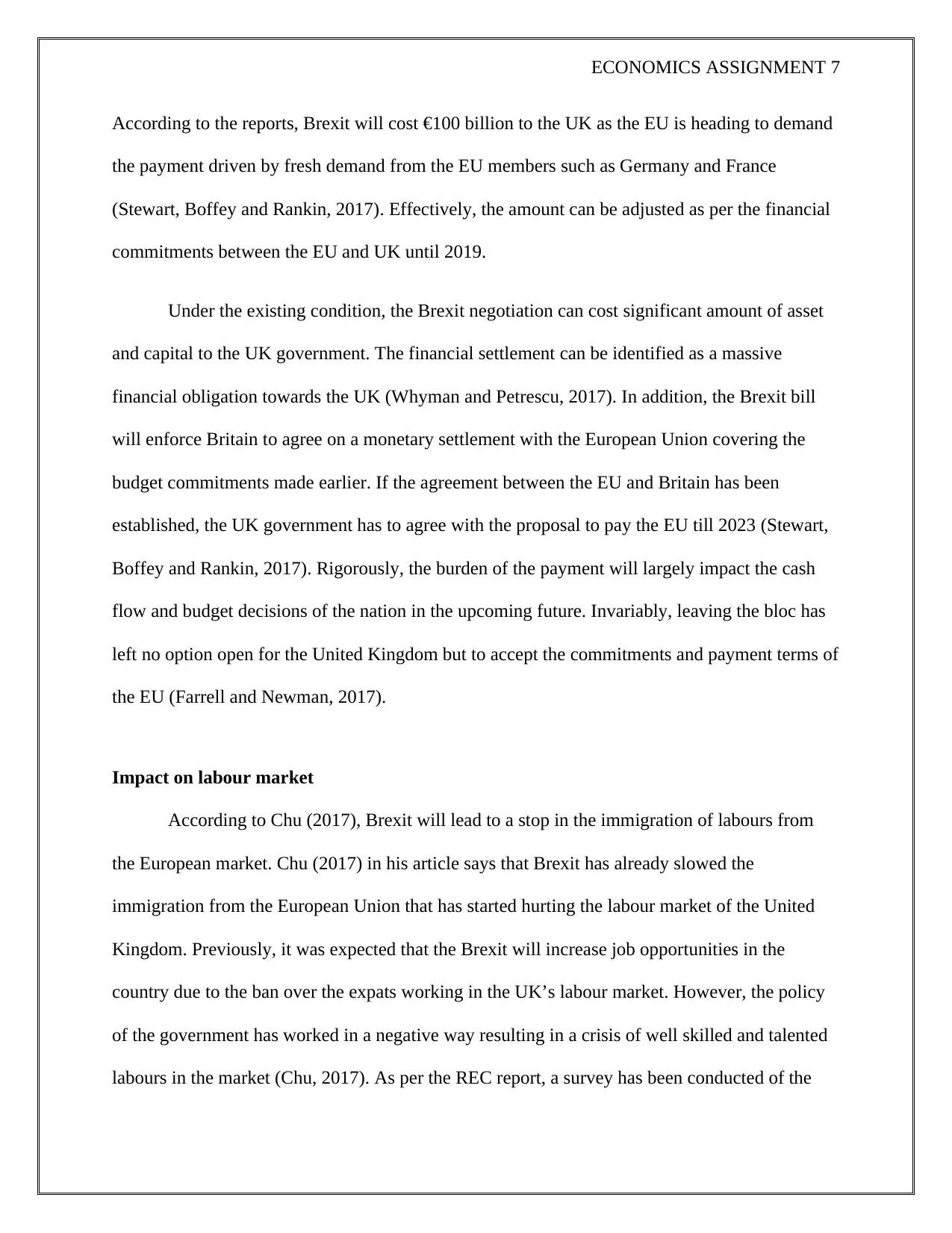
ECONOMICS ASSIGNMENT 7
According to the reports, Brexit will cost €100 billion to the UK as the EU is heading to demand
the payment driven by fresh demand from the EU members such as Germany and France
(Stewart, Boffey and Rankin, 2017). Effectively, the amount can be adjusted as per the financial
commitments between the EU and UK until 2019.
Under the existing condition, the Brexit negotiation can cost significant amount of asset
and capital to the UK government. The financial settlement can be identified as a massive
financial obligation towards the UK (Whyman and Petrescu, 2017). In addition, the Brexit bill
will enforce Britain to agree on a monetary settlement with the European Union covering the
budget commitments made earlier. If the agreement between the EU and Britain has been
established, the UK government has to agree with the proposal to pay the EU till 2023 (Stewart,
Boffey and Rankin, 2017). Rigorously, the burden of the payment will largely impact the cash
flow and budget decisions of the nation in the upcoming future. Invariably, leaving the bloc has
left no option open for the United Kingdom but to accept the commitments and payment terms of
the EU (Farrell and Newman, 2017).
Impact on labour market
According to Chu (2017), Brexit will lead to a stop in the immigration of labours from
the European market. Chu (2017) in his article says that Brexit has already slowed the
immigration from the European Union that has started hurting the labour market of the United
Kingdom. Previously, it was expected that the Brexit will increase job opportunities in the
country due to the ban over the expats working in the UK’s labour market. However, the policy
of the government has worked in a negative way resulting in a crisis of well skilled and talented
labours in the market (Chu, 2017). As per the REC report, a survey has been conducted of the
According to the reports, Brexit will cost €100 billion to the UK as the EU is heading to demand
the payment driven by fresh demand from the EU members such as Germany and France
(Stewart, Boffey and Rankin, 2017). Effectively, the amount can be adjusted as per the financial
commitments between the EU and UK until 2019.
Under the existing condition, the Brexit negotiation can cost significant amount of asset
and capital to the UK government. The financial settlement can be identified as a massive
financial obligation towards the UK (Whyman and Petrescu, 2017). In addition, the Brexit bill
will enforce Britain to agree on a monetary settlement with the European Union covering the
budget commitments made earlier. If the agreement between the EU and Britain has been
established, the UK government has to agree with the proposal to pay the EU till 2023 (Stewart,
Boffey and Rankin, 2017). Rigorously, the burden of the payment will largely impact the cash
flow and budget decisions of the nation in the upcoming future. Invariably, leaving the bloc has
left no option open for the United Kingdom but to accept the commitments and payment terms of
the EU (Farrell and Newman, 2017).
Impact on labour market
According to Chu (2017), Brexit will lead to a stop in the immigration of labours from
the European market. Chu (2017) in his article says that Brexit has already slowed the
immigration from the European Union that has started hurting the labour market of the United
Kingdom. Previously, it was expected that the Brexit will increase job opportunities in the
country due to the ban over the expats working in the UK’s labour market. However, the policy
of the government has worked in a negative way resulting in a crisis of well skilled and talented
labours in the market (Chu, 2017). As per the REC report, a survey has been conducted of the
Paraphrase This Document
Need a fresh take? Get an instant paraphrase of this document with our AI Paraphraser
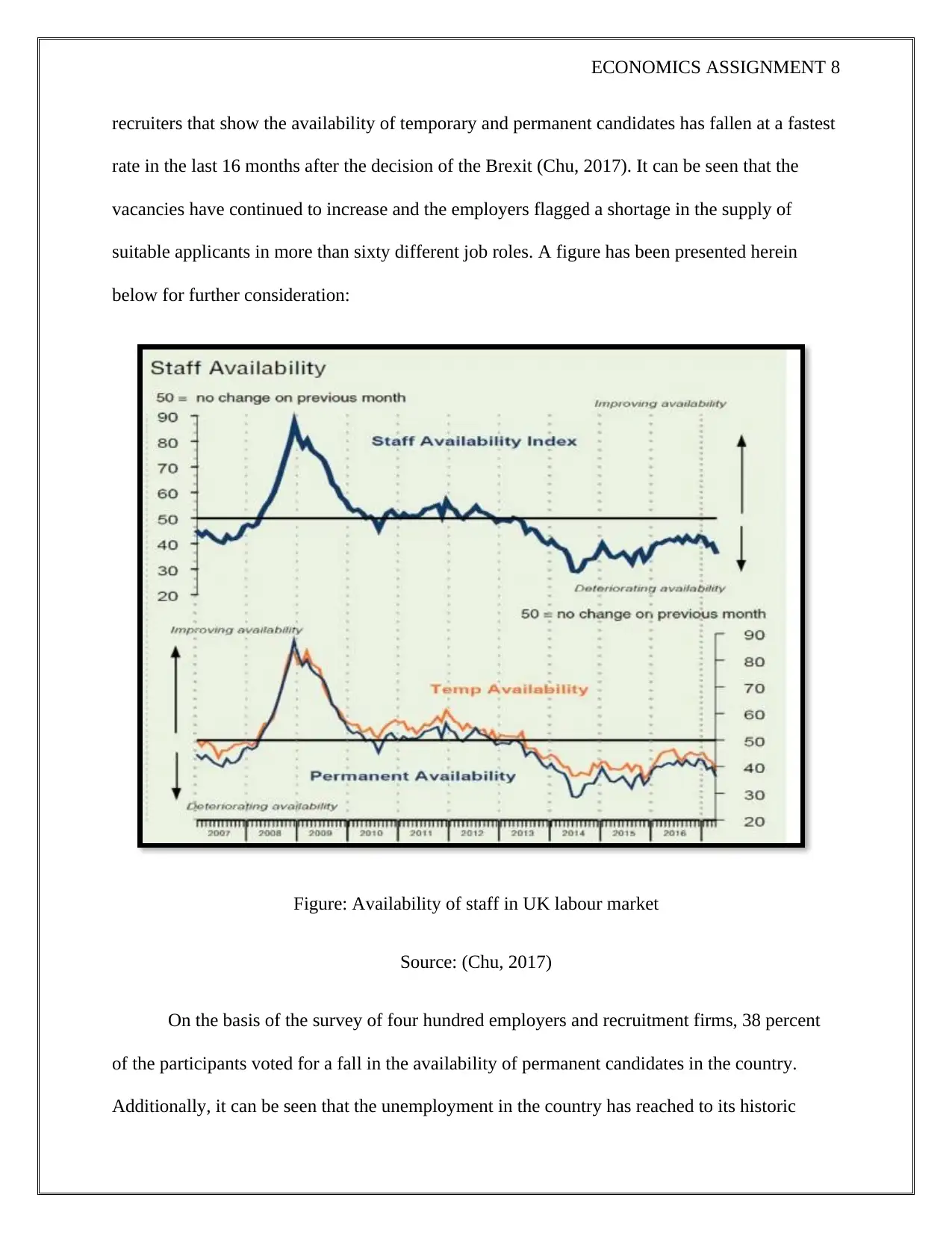
ECONOMICS ASSIGNMENT 8
recruiters that show the availability of temporary and permanent candidates has fallen at a fastest
rate in the last 16 months after the decision of the Brexit (Chu, 2017). It can be seen that the
vacancies have continued to increase and the employers flagged a shortage in the supply of
suitable applicants in more than sixty different job roles. A figure has been presented herein
below for further consideration:
Figure: Availability of staff in UK labour market
Source: (Chu, 2017)
On the basis of the survey of four hundred employers and recruitment firms, 38 percent
of the participants voted for a fall in the availability of permanent candidates in the country.
Additionally, it can be seen that the unemployment in the country has reached to its historic
recruiters that show the availability of temporary and permanent candidates has fallen at a fastest
rate in the last 16 months after the decision of the Brexit (Chu, 2017). It can be seen that the
vacancies have continued to increase and the employers flagged a shortage in the supply of
suitable applicants in more than sixty different job roles. A figure has been presented herein
below for further consideration:
Figure: Availability of staff in UK labour market
Source: (Chu, 2017)
On the basis of the survey of four hundred employers and recruitment firms, 38 percent
of the participants voted for a fall in the availability of permanent candidates in the country.
Additionally, it can be seen that the unemployment in the country has reached to its historic
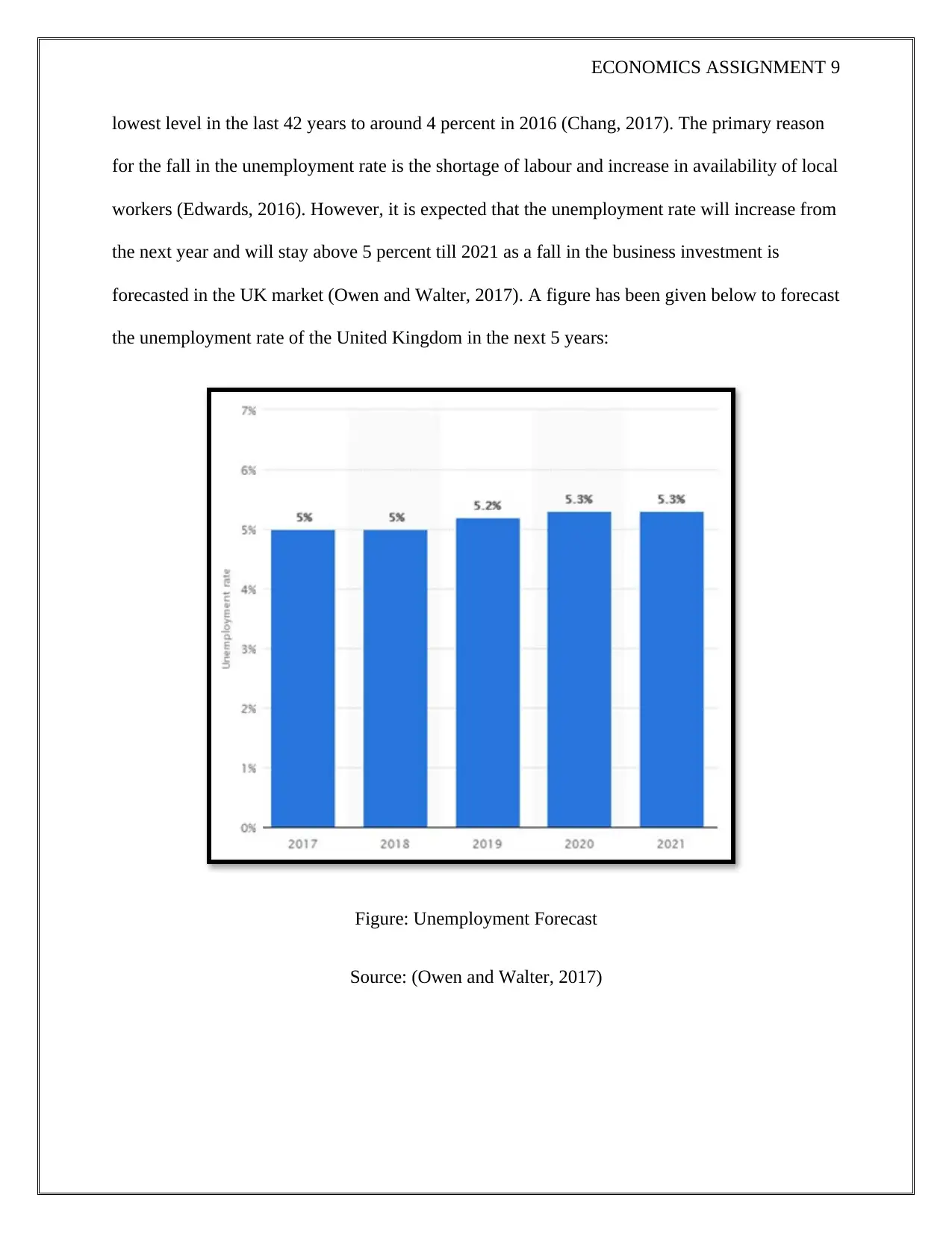
ECONOMICS ASSIGNMENT 9
lowest level in the last 42 years to around 4 percent in 2016 (Chang, 2017). The primary reason
for the fall in the unemployment rate is the shortage of labour and increase in availability of local
workers (Edwards, 2016). However, it is expected that the unemployment rate will increase from
the next year and will stay above 5 percent till 2021 as a fall in the business investment is
forecasted in the UK market (Owen and Walter, 2017). A figure has been given below to forecast
the unemployment rate of the United Kingdom in the next 5 years:
Figure: Unemployment Forecast
Source: (Owen and Walter, 2017)
lowest level in the last 42 years to around 4 percent in 2016 (Chang, 2017). The primary reason
for the fall in the unemployment rate is the shortage of labour and increase in availability of local
workers (Edwards, 2016). However, it is expected that the unemployment rate will increase from
the next year and will stay above 5 percent till 2021 as a fall in the business investment is
forecasted in the UK market (Owen and Walter, 2017). A figure has been given below to forecast
the unemployment rate of the United Kingdom in the next 5 years:
Figure: Unemployment Forecast
Source: (Owen and Walter, 2017)
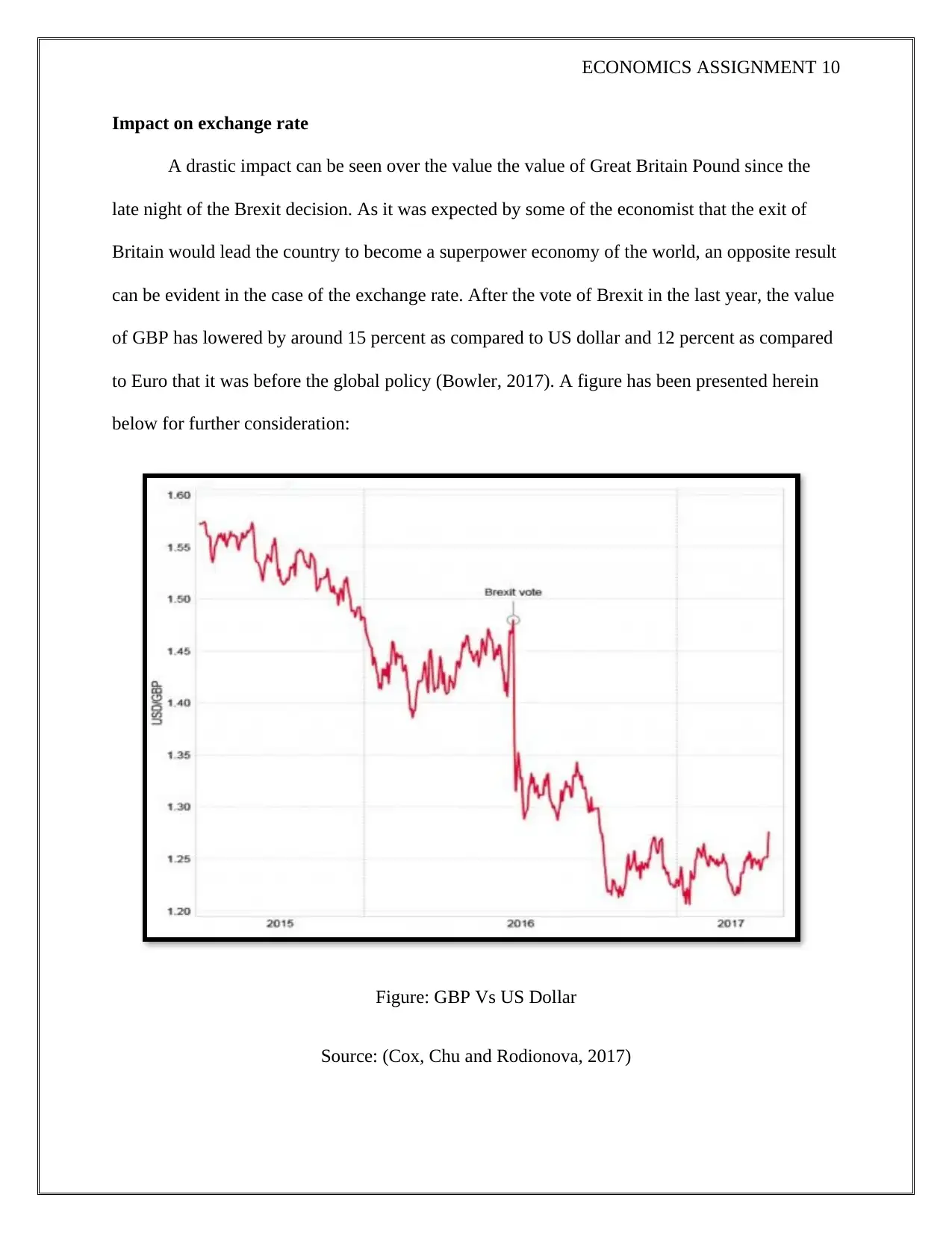
ECONOMICS ASSIGNMENT 10
Impact on exchange rate
A drastic impact can be seen over the value the value of Great Britain Pound since the
late night of the Brexit decision. As it was expected by some of the economist that the exit of
Britain would lead the country to become a superpower economy of the world, an opposite result
can be evident in the case of the exchange rate. After the vote of Brexit in the last year, the value
of GBP has lowered by around 15 percent as compared to US dollar and 12 percent as compared
to Euro that it was before the global policy (Bowler, 2017). A figure has been presented herein
below for further consideration:
Figure: GBP Vs US Dollar
Source: (Cox, Chu and Rodionova, 2017)
Impact on exchange rate
A drastic impact can be seen over the value the value of Great Britain Pound since the
late night of the Brexit decision. As it was expected by some of the economist that the exit of
Britain would lead the country to become a superpower economy of the world, an opposite result
can be evident in the case of the exchange rate. After the vote of Brexit in the last year, the value
of GBP has lowered by around 15 percent as compared to US dollar and 12 percent as compared
to Euro that it was before the global policy (Bowler, 2017). A figure has been presented herein
below for further consideration:
Figure: GBP Vs US Dollar
Source: (Cox, Chu and Rodionova, 2017)
Secure Best Marks with AI Grader
Need help grading? Try our AI Grader for instant feedback on your assignments.
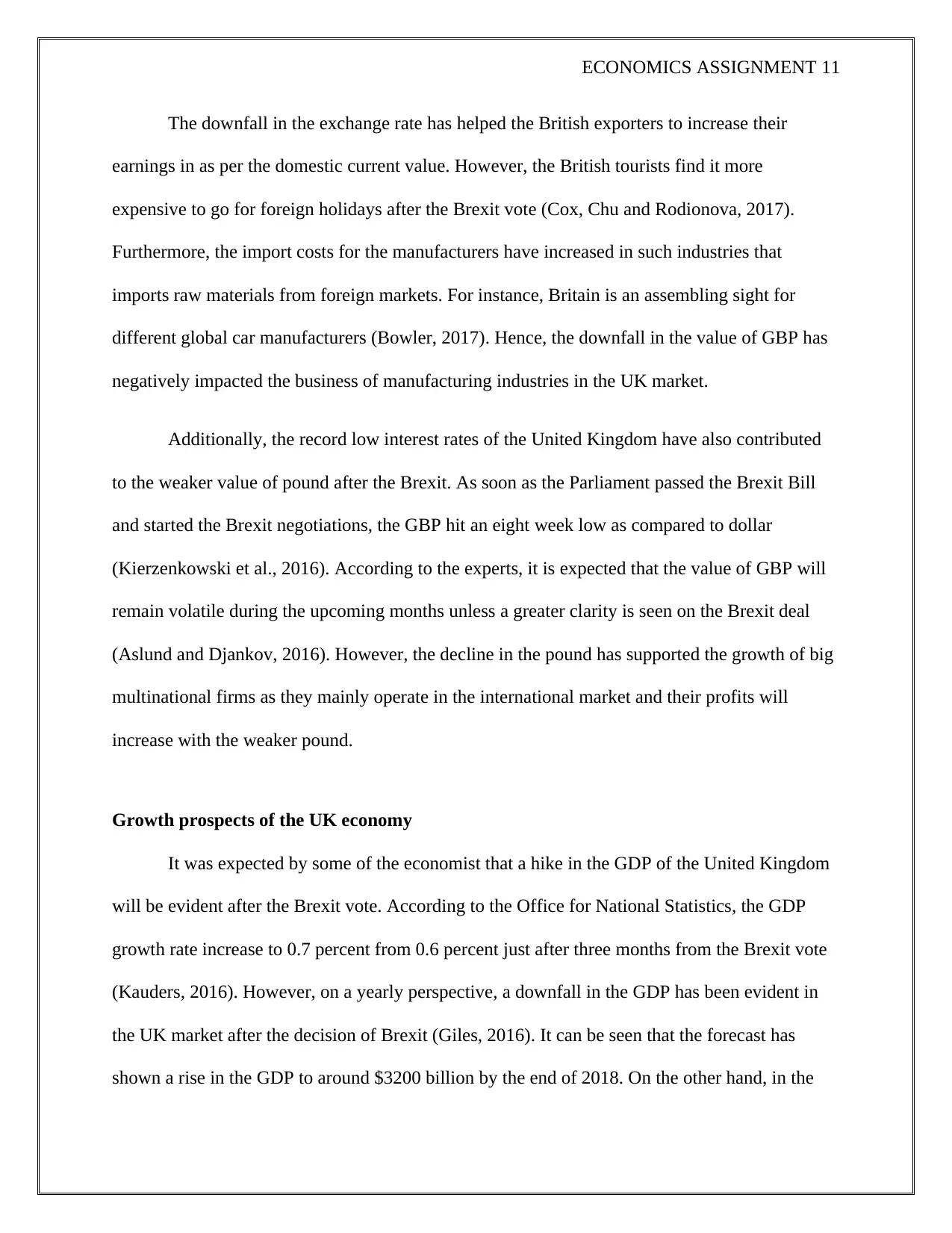
ECONOMICS ASSIGNMENT 11
The downfall in the exchange rate has helped the British exporters to increase their
earnings in as per the domestic current value. However, the British tourists find it more
expensive to go for foreign holidays after the Brexit vote (Cox, Chu and Rodionova, 2017).
Furthermore, the import costs for the manufacturers have increased in such industries that
imports raw materials from foreign markets. For instance, Britain is an assembling sight for
different global car manufacturers (Bowler, 2017). Hence, the downfall in the value of GBP has
negatively impacted the business of manufacturing industries in the UK market.
Additionally, the record low interest rates of the United Kingdom have also contributed
to the weaker value of pound after the Brexit. As soon as the Parliament passed the Brexit Bill
and started the Brexit negotiations, the GBP hit an eight week low as compared to dollar
(Kierzenkowski et al., 2016). According to the experts, it is expected that the value of GBP will
remain volatile during the upcoming months unless a greater clarity is seen on the Brexit deal
(Aslund and Djankov, 2016). However, the decline in the pound has supported the growth of big
multinational firms as they mainly operate in the international market and their profits will
increase with the weaker pound.
Growth prospects of the UK economy
It was expected by some of the economist that a hike in the GDP of the United Kingdom
will be evident after the Brexit vote. According to the Office for National Statistics, the GDP
growth rate increase to 0.7 percent from 0.6 percent just after three months from the Brexit vote
(Kauders, 2016). However, on a yearly perspective, a downfall in the GDP has been evident in
the UK market after the decision of Brexit (Giles, 2016). It can be seen that the forecast has
shown a rise in the GDP to around $3200 billion by the end of 2018. On the other hand, in the
The downfall in the exchange rate has helped the British exporters to increase their
earnings in as per the domestic current value. However, the British tourists find it more
expensive to go for foreign holidays after the Brexit vote (Cox, Chu and Rodionova, 2017).
Furthermore, the import costs for the manufacturers have increased in such industries that
imports raw materials from foreign markets. For instance, Britain is an assembling sight for
different global car manufacturers (Bowler, 2017). Hence, the downfall in the value of GBP has
negatively impacted the business of manufacturing industries in the UK market.
Additionally, the record low interest rates of the United Kingdom have also contributed
to the weaker value of pound after the Brexit. As soon as the Parliament passed the Brexit Bill
and started the Brexit negotiations, the GBP hit an eight week low as compared to dollar
(Kierzenkowski et al., 2016). According to the experts, it is expected that the value of GBP will
remain volatile during the upcoming months unless a greater clarity is seen on the Brexit deal
(Aslund and Djankov, 2016). However, the decline in the pound has supported the growth of big
multinational firms as they mainly operate in the international market and their profits will
increase with the weaker pound.
Growth prospects of the UK economy
It was expected by some of the economist that a hike in the GDP of the United Kingdom
will be evident after the Brexit vote. According to the Office for National Statistics, the GDP
growth rate increase to 0.7 percent from 0.6 percent just after three months from the Brexit vote
(Kauders, 2016). However, on a yearly perspective, a downfall in the GDP has been evident in
the UK market after the decision of Brexit (Giles, 2016). It can be seen that the forecast has
shown a rise in the GDP to around $3200 billion by the end of 2018. On the other hand, in the
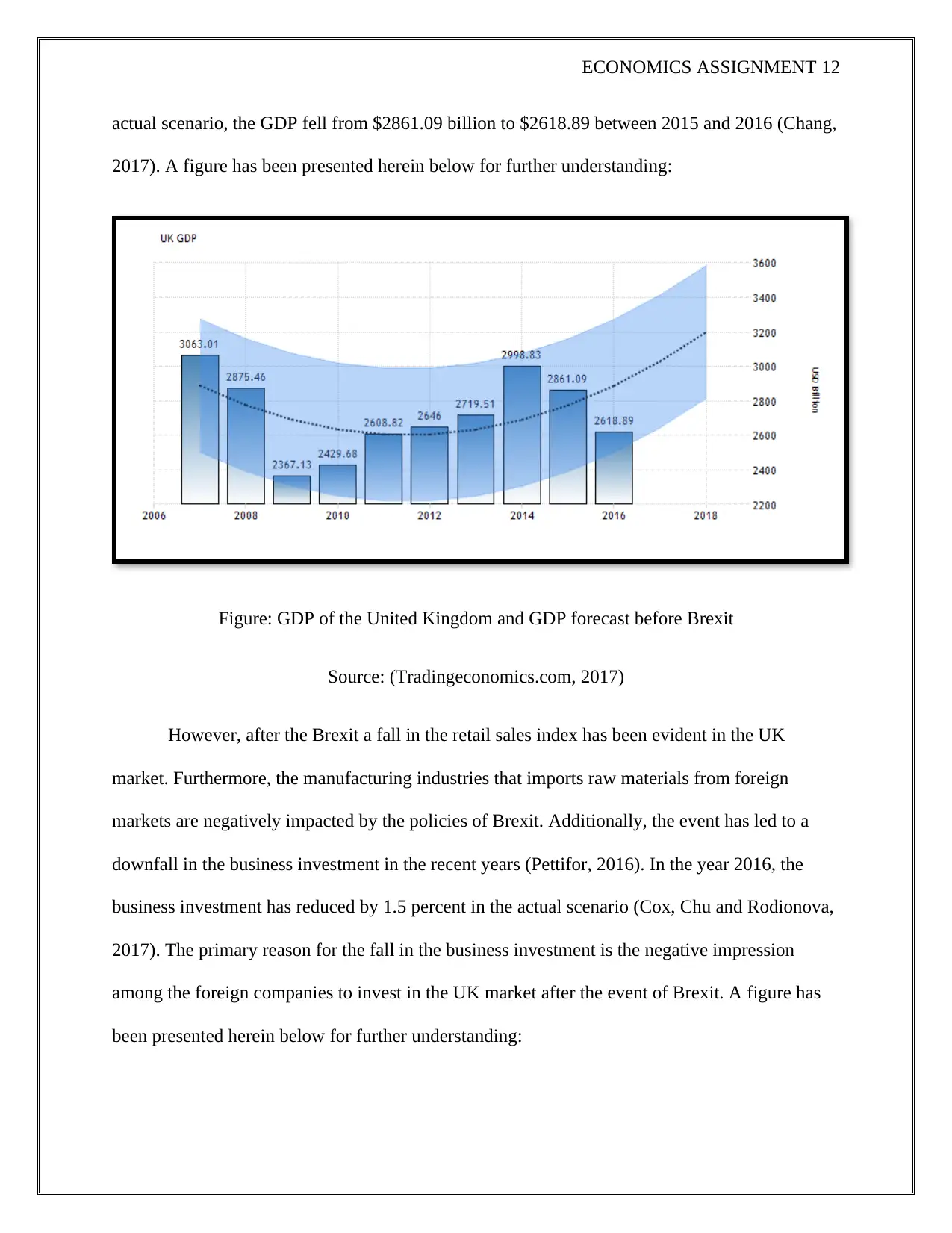
ECONOMICS ASSIGNMENT 12
actual scenario, the GDP fell from $2861.09 billion to $2618.89 between 2015 and 2016 (Chang,
2017). A figure has been presented herein below for further understanding:
Figure: GDP of the United Kingdom and GDP forecast before Brexit
Source: (Tradingeconomics.com, 2017)
However, after the Brexit a fall in the retail sales index has been evident in the UK
market. Furthermore, the manufacturing industries that imports raw materials from foreign
markets are negatively impacted by the policies of Brexit. Additionally, the event has led to a
downfall in the business investment in the recent years (Pettifor, 2016). In the year 2016, the
business investment has reduced by 1.5 percent in the actual scenario (Cox, Chu and Rodionova,
2017). The primary reason for the fall in the business investment is the negative impression
among the foreign companies to invest in the UK market after the event of Brexit. A figure has
been presented herein below for further understanding:
actual scenario, the GDP fell from $2861.09 billion to $2618.89 between 2015 and 2016 (Chang,
2017). A figure has been presented herein below for further understanding:
Figure: GDP of the United Kingdom and GDP forecast before Brexit
Source: (Tradingeconomics.com, 2017)
However, after the Brexit a fall in the retail sales index has been evident in the UK
market. Furthermore, the manufacturing industries that imports raw materials from foreign
markets are negatively impacted by the policies of Brexit. Additionally, the event has led to a
downfall in the business investment in the recent years (Pettifor, 2016). In the year 2016, the
business investment has reduced by 1.5 percent in the actual scenario (Cox, Chu and Rodionova,
2017). The primary reason for the fall in the business investment is the negative impression
among the foreign companies to invest in the UK market after the event of Brexit. A figure has
been presented herein below for further understanding:
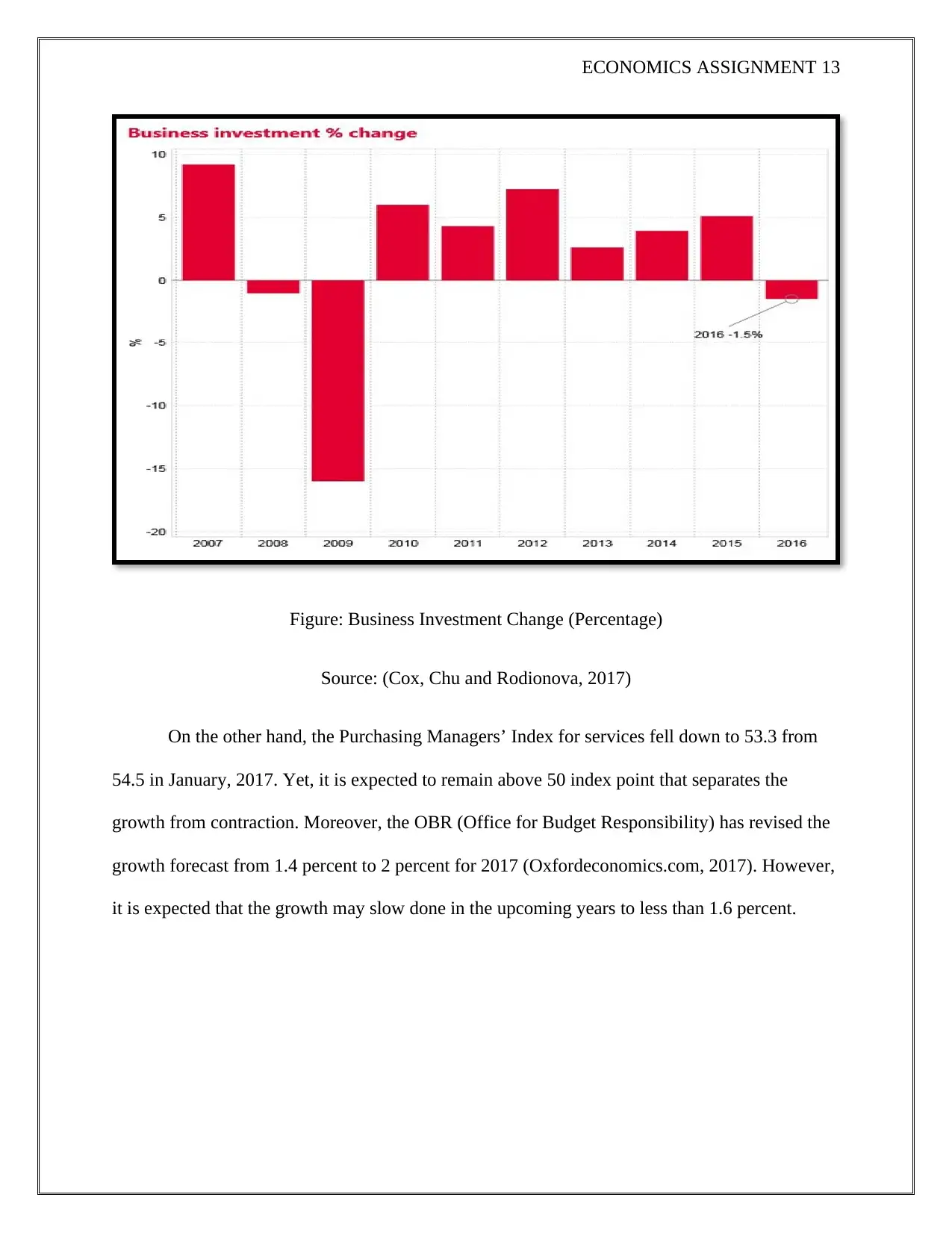
ECONOMICS ASSIGNMENT 13
Figure: Business Investment Change (Percentage)
Source: (Cox, Chu and Rodionova, 2017)
On the other hand, the Purchasing Managers’ Index for services fell down to 53.3 from
54.5 in January, 2017. Yet, it is expected to remain above 50 index point that separates the
growth from contraction. Moreover, the OBR (Office for Budget Responsibility) has revised the
growth forecast from 1.4 percent to 2 percent for 2017 (Oxfordeconomics.com, 2017). However,
it is expected that the growth may slow done in the upcoming years to less than 1.6 percent.
Figure: Business Investment Change (Percentage)
Source: (Cox, Chu and Rodionova, 2017)
On the other hand, the Purchasing Managers’ Index for services fell down to 53.3 from
54.5 in January, 2017. Yet, it is expected to remain above 50 index point that separates the
growth from contraction. Moreover, the OBR (Office for Budget Responsibility) has revised the
growth forecast from 1.4 percent to 2 percent for 2017 (Oxfordeconomics.com, 2017). However,
it is expected that the growth may slow done in the upcoming years to less than 1.6 percent.
Paraphrase This Document
Need a fresh take? Get an instant paraphrase of this document with our AI Paraphraser
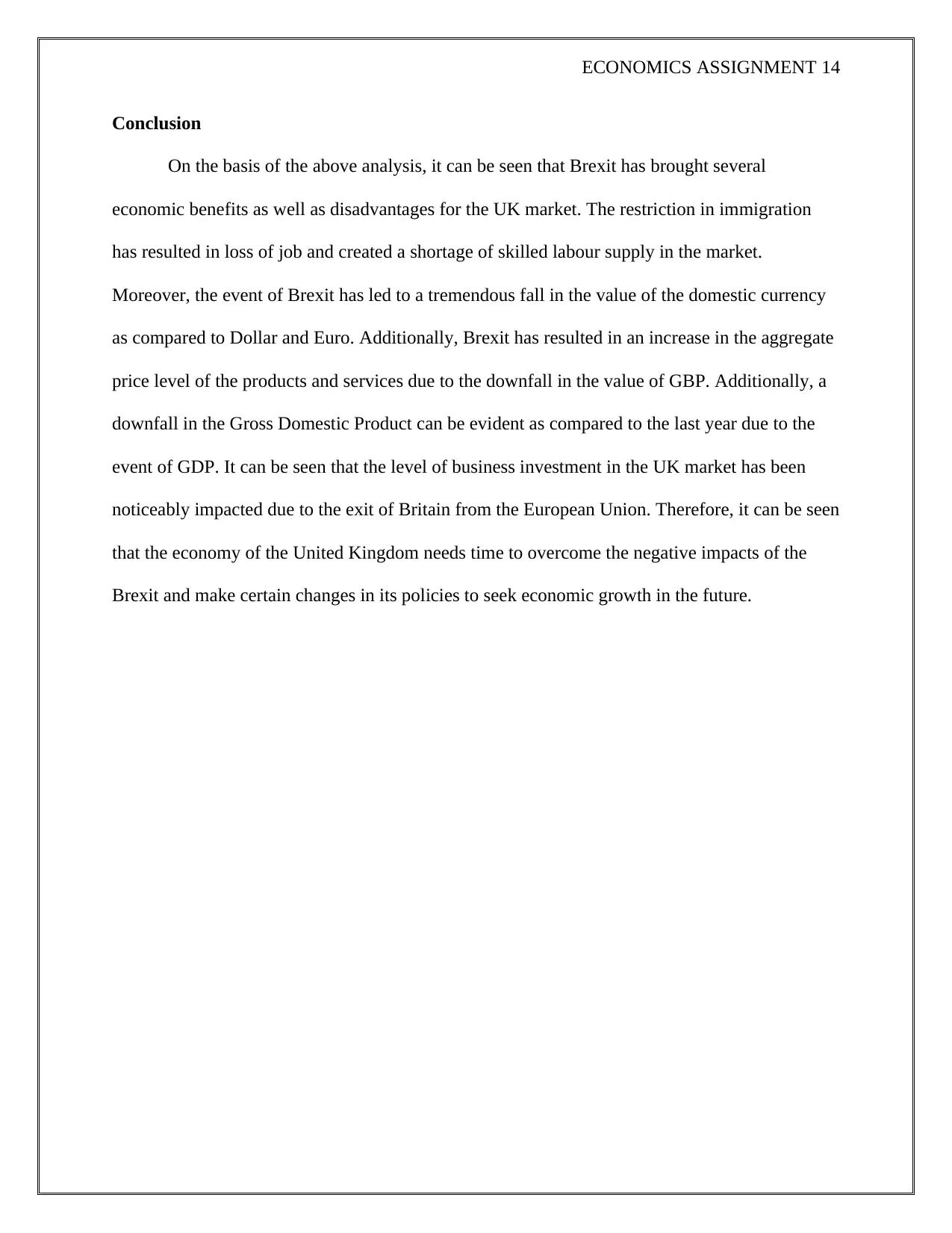
ECONOMICS ASSIGNMENT 14
Conclusion
On the basis of the above analysis, it can be seen that Brexit has brought several
economic benefits as well as disadvantages for the UK market. The restriction in immigration
has resulted in loss of job and created a shortage of skilled labour supply in the market.
Moreover, the event of Brexit has led to a tremendous fall in the value of the domestic currency
as compared to Dollar and Euro. Additionally, Brexit has resulted in an increase in the aggregate
price level of the products and services due to the downfall in the value of GBP. Additionally, a
downfall in the Gross Domestic Product can be evident as compared to the last year due to the
event of GDP. It can be seen that the level of business investment in the UK market has been
noticeably impacted due to the exit of Britain from the European Union. Therefore, it can be seen
that the economy of the United Kingdom needs time to overcome the negative impacts of the
Brexit and make certain changes in its policies to seek economic growth in the future.
Conclusion
On the basis of the above analysis, it can be seen that Brexit has brought several
economic benefits as well as disadvantages for the UK market. The restriction in immigration
has resulted in loss of job and created a shortage of skilled labour supply in the market.
Moreover, the event of Brexit has led to a tremendous fall in the value of the domestic currency
as compared to Dollar and Euro. Additionally, Brexit has resulted in an increase in the aggregate
price level of the products and services due to the downfall in the value of GBP. Additionally, a
downfall in the Gross Domestic Product can be evident as compared to the last year due to the
event of GDP. It can be seen that the level of business investment in the UK market has been
noticeably impacted due to the exit of Britain from the European Union. Therefore, it can be seen
that the economy of the United Kingdom needs time to overcome the negative impacts of the
Brexit and make certain changes in its policies to seek economic growth in the future.
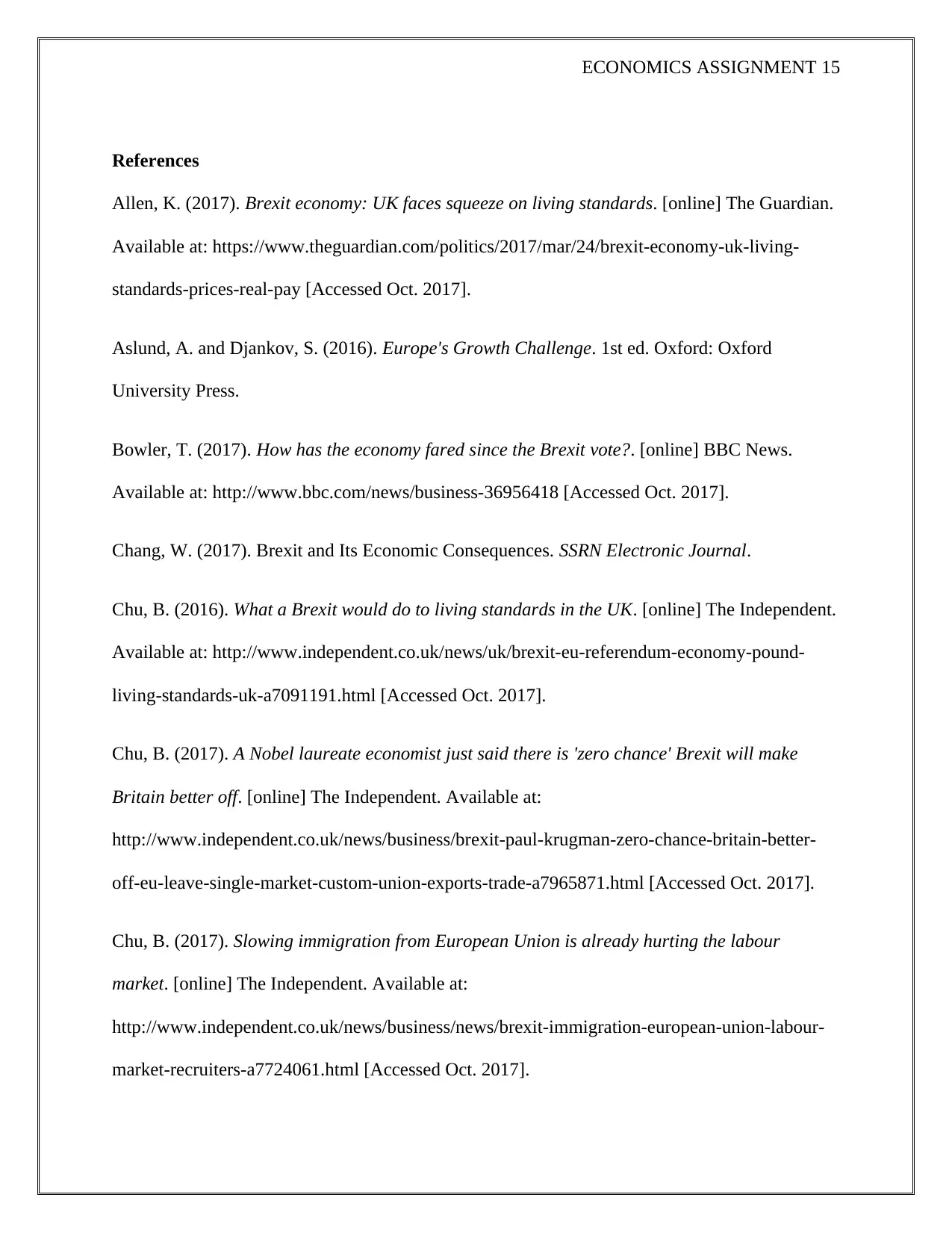
ECONOMICS ASSIGNMENT 15
References
Allen, K. (2017). Brexit economy: UK faces squeeze on living standards. [online] The Guardian.
Available at: https://www.theguardian.com/politics/2017/mar/24/brexit-economy-uk-living-
standards-prices-real-pay [Accessed Oct. 2017].
Aslund, A. and Djankov, S. (2016). Europe's Growth Challenge. 1st ed. Oxford: Oxford
University Press.
Bowler, T. (2017). How has the economy fared since the Brexit vote?. [online] BBC News.
Available at: http://www.bbc.com/news/business-36956418 [Accessed Oct. 2017].
Chang, W. (2017). Brexit and Its Economic Consequences. SSRN Electronic Journal.
Chu, B. (2016). What a Brexit would do to living standards in the UK. [online] The Independent.
Available at: http://www.independent.co.uk/news/uk/brexit-eu-referendum-economy-pound-
living-standards-uk-a7091191.html [Accessed Oct. 2017].
Chu, B. (2017). A Nobel laureate economist just said there is 'zero chance' Brexit will make
Britain better off. [online] The Independent. Available at:
http://www.independent.co.uk/news/business/brexit-paul-krugman-zero-chance-britain-better-
off-eu-leave-single-market-custom-union-exports-trade-a7965871.html [Accessed Oct. 2017].
Chu, B. (2017). Slowing immigration from European Union is already hurting the labour
market. [online] The Independent. Available at:
http://www.independent.co.uk/news/business/news/brexit-immigration-european-union-labour-
market-recruiters-a7724061.html [Accessed Oct. 2017].
References
Allen, K. (2017). Brexit economy: UK faces squeeze on living standards. [online] The Guardian.
Available at: https://www.theguardian.com/politics/2017/mar/24/brexit-economy-uk-living-
standards-prices-real-pay [Accessed Oct. 2017].
Aslund, A. and Djankov, S. (2016). Europe's Growth Challenge. 1st ed. Oxford: Oxford
University Press.
Bowler, T. (2017). How has the economy fared since the Brexit vote?. [online] BBC News.
Available at: http://www.bbc.com/news/business-36956418 [Accessed Oct. 2017].
Chang, W. (2017). Brexit and Its Economic Consequences. SSRN Electronic Journal.
Chu, B. (2016). What a Brexit would do to living standards in the UK. [online] The Independent.
Available at: http://www.independent.co.uk/news/uk/brexit-eu-referendum-economy-pound-
living-standards-uk-a7091191.html [Accessed Oct. 2017].
Chu, B. (2017). A Nobel laureate economist just said there is 'zero chance' Brexit will make
Britain better off. [online] The Independent. Available at:
http://www.independent.co.uk/news/business/brexit-paul-krugman-zero-chance-britain-better-
off-eu-leave-single-market-custom-union-exports-trade-a7965871.html [Accessed Oct. 2017].
Chu, B. (2017). Slowing immigration from European Union is already hurting the labour
market. [online] The Independent. Available at:
http://www.independent.co.uk/news/business/news/brexit-immigration-european-union-labour-
market-recruiters-a7724061.html [Accessed Oct. 2017].
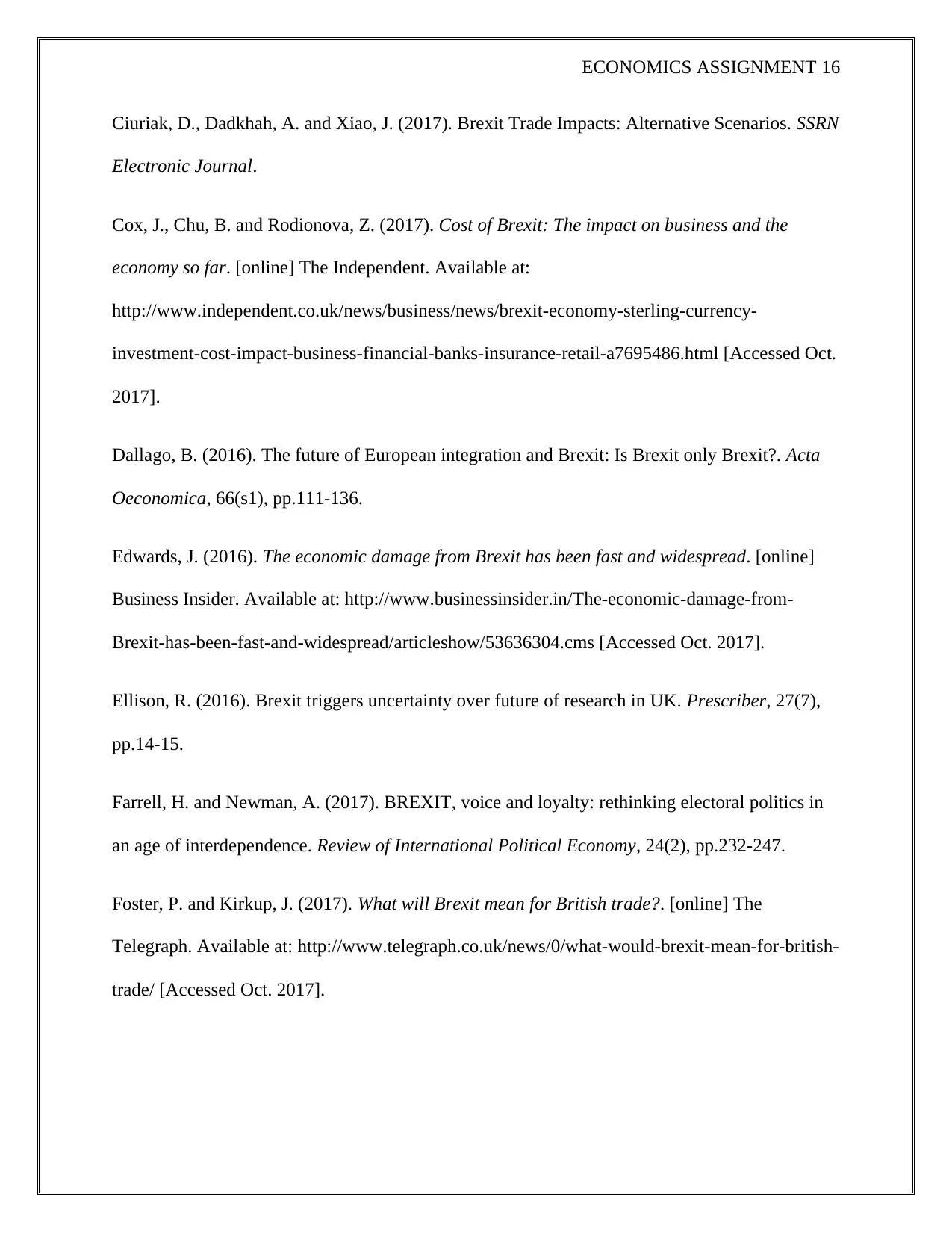
ECONOMICS ASSIGNMENT 16
Ciuriak, D., Dadkhah, A. and Xiao, J. (2017). Brexit Trade Impacts: Alternative Scenarios. SSRN
Electronic Journal.
Cox, J., Chu, B. and Rodionova, Z. (2017). Cost of Brexit: The impact on business and the
economy so far. [online] The Independent. Available at:
http://www.independent.co.uk/news/business/news/brexit-economy-sterling-currency-
investment-cost-impact-business-financial-banks-insurance-retail-a7695486.html [Accessed Oct.
2017].
Dallago, B. (2016). The future of European integration and Brexit: Is Brexit only Brexit?. Acta
Oeconomica, 66(s1), pp.111-136.
Edwards, J. (2016). The economic damage from Brexit has been fast and widespread. [online]
Business Insider. Available at: http://www.businessinsider.in/The-economic-damage-from-
Brexit-has-been-fast-and-widespread/articleshow/53636304.cms [Accessed Oct. 2017].
Ellison, R. (2016). Brexit triggers uncertainty over future of research in UK. Prescriber, 27(7),
pp.14-15.
Farrell, H. and Newman, A. (2017). BREXIT, voice and loyalty: rethinking electoral politics in
an age of interdependence. Review of International Political Economy, 24(2), pp.232-247.
Foster, P. and Kirkup, J. (2017). What will Brexit mean for British trade?. [online] The
Telegraph. Available at: http://www.telegraph.co.uk/news/0/what-would-brexit-mean-for-british-
trade/ [Accessed Oct. 2017].
Ciuriak, D., Dadkhah, A. and Xiao, J. (2017). Brexit Trade Impacts: Alternative Scenarios. SSRN
Electronic Journal.
Cox, J., Chu, B. and Rodionova, Z. (2017). Cost of Brexit: The impact on business and the
economy so far. [online] The Independent. Available at:
http://www.independent.co.uk/news/business/news/brexit-economy-sterling-currency-
investment-cost-impact-business-financial-banks-insurance-retail-a7695486.html [Accessed Oct.
2017].
Dallago, B. (2016). The future of European integration and Brexit: Is Brexit only Brexit?. Acta
Oeconomica, 66(s1), pp.111-136.
Edwards, J. (2016). The economic damage from Brexit has been fast and widespread. [online]
Business Insider. Available at: http://www.businessinsider.in/The-economic-damage-from-
Brexit-has-been-fast-and-widespread/articleshow/53636304.cms [Accessed Oct. 2017].
Ellison, R. (2016). Brexit triggers uncertainty over future of research in UK. Prescriber, 27(7),
pp.14-15.
Farrell, H. and Newman, A. (2017). BREXIT, voice and loyalty: rethinking electoral politics in
an age of interdependence. Review of International Political Economy, 24(2), pp.232-247.
Foster, P. and Kirkup, J. (2017). What will Brexit mean for British trade?. [online] The
Telegraph. Available at: http://www.telegraph.co.uk/news/0/what-would-brexit-mean-for-british-
trade/ [Accessed Oct. 2017].
Secure Best Marks with AI Grader
Need help grading? Try our AI Grader for instant feedback on your assignments.
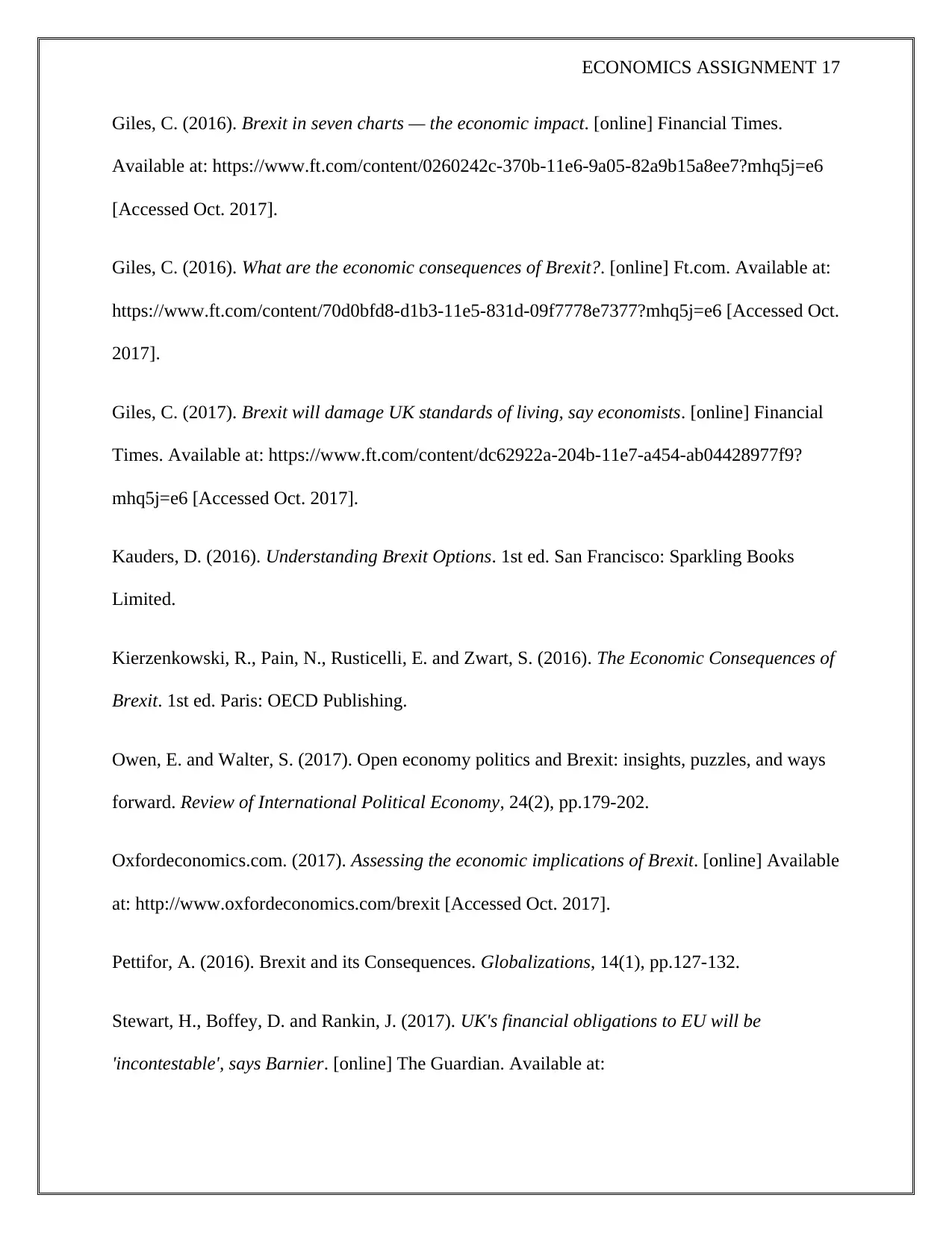
ECONOMICS ASSIGNMENT 17
Giles, C. (2016). Brexit in seven charts — the economic impact. [online] Financial Times.
Available at: https://www.ft.com/content/0260242c-370b-11e6-9a05-82a9b15a8ee7?mhq5j=e6
[Accessed Oct. 2017].
Giles, C. (2016). What are the economic consequences of Brexit?. [online] Ft.com. Available at:
https://www.ft.com/content/70d0bfd8-d1b3-11e5-831d-09f7778e7377?mhq5j=e6 [Accessed Oct.
2017].
Giles, C. (2017). Brexit will damage UK standards of living, say economists. [online] Financial
Times. Available at: https://www.ft.com/content/dc62922a-204b-11e7-a454-ab04428977f9?
mhq5j=e6 [Accessed Oct. 2017].
Kauders, D. (2016). Understanding Brexit Options. 1st ed. San Francisco: Sparkling Books
Limited.
Kierzenkowski, R., Pain, N., Rusticelli, E. and Zwart, S. (2016). The Economic Consequences of
Brexit. 1st ed. Paris: OECD Publishing.
Owen, E. and Walter, S. (2017). Open economy politics and Brexit: insights, puzzles, and ways
forward. Review of International Political Economy, 24(2), pp.179-202.
Oxfordeconomics.com. (2017). Assessing the economic implications of Brexit. [online] Available
at: http://www.oxfordeconomics.com/brexit [Accessed Oct. 2017].
Pettifor, A. (2016). Brexit and its Consequences. Globalizations, 14(1), pp.127-132.
Stewart, H., Boffey, D. and Rankin, J. (2017). UK's financial obligations to EU will be
'incontestable', says Barnier. [online] The Guardian. Available at:
Giles, C. (2016). Brexit in seven charts — the economic impact. [online] Financial Times.
Available at: https://www.ft.com/content/0260242c-370b-11e6-9a05-82a9b15a8ee7?mhq5j=e6
[Accessed Oct. 2017].
Giles, C. (2016). What are the economic consequences of Brexit?. [online] Ft.com. Available at:
https://www.ft.com/content/70d0bfd8-d1b3-11e5-831d-09f7778e7377?mhq5j=e6 [Accessed Oct.
2017].
Giles, C. (2017). Brexit will damage UK standards of living, say economists. [online] Financial
Times. Available at: https://www.ft.com/content/dc62922a-204b-11e7-a454-ab04428977f9?
mhq5j=e6 [Accessed Oct. 2017].
Kauders, D. (2016). Understanding Brexit Options. 1st ed. San Francisco: Sparkling Books
Limited.
Kierzenkowski, R., Pain, N., Rusticelli, E. and Zwart, S. (2016). The Economic Consequences of
Brexit. 1st ed. Paris: OECD Publishing.
Owen, E. and Walter, S. (2017). Open economy politics and Brexit: insights, puzzles, and ways
forward. Review of International Political Economy, 24(2), pp.179-202.
Oxfordeconomics.com. (2017). Assessing the economic implications of Brexit. [online] Available
at: http://www.oxfordeconomics.com/brexit [Accessed Oct. 2017].
Pettifor, A. (2016). Brexit and its Consequences. Globalizations, 14(1), pp.127-132.
Stewart, H., Boffey, D. and Rankin, J. (2017). UK's financial obligations to EU will be
'incontestable', says Barnier. [online] The Guardian. Available at:
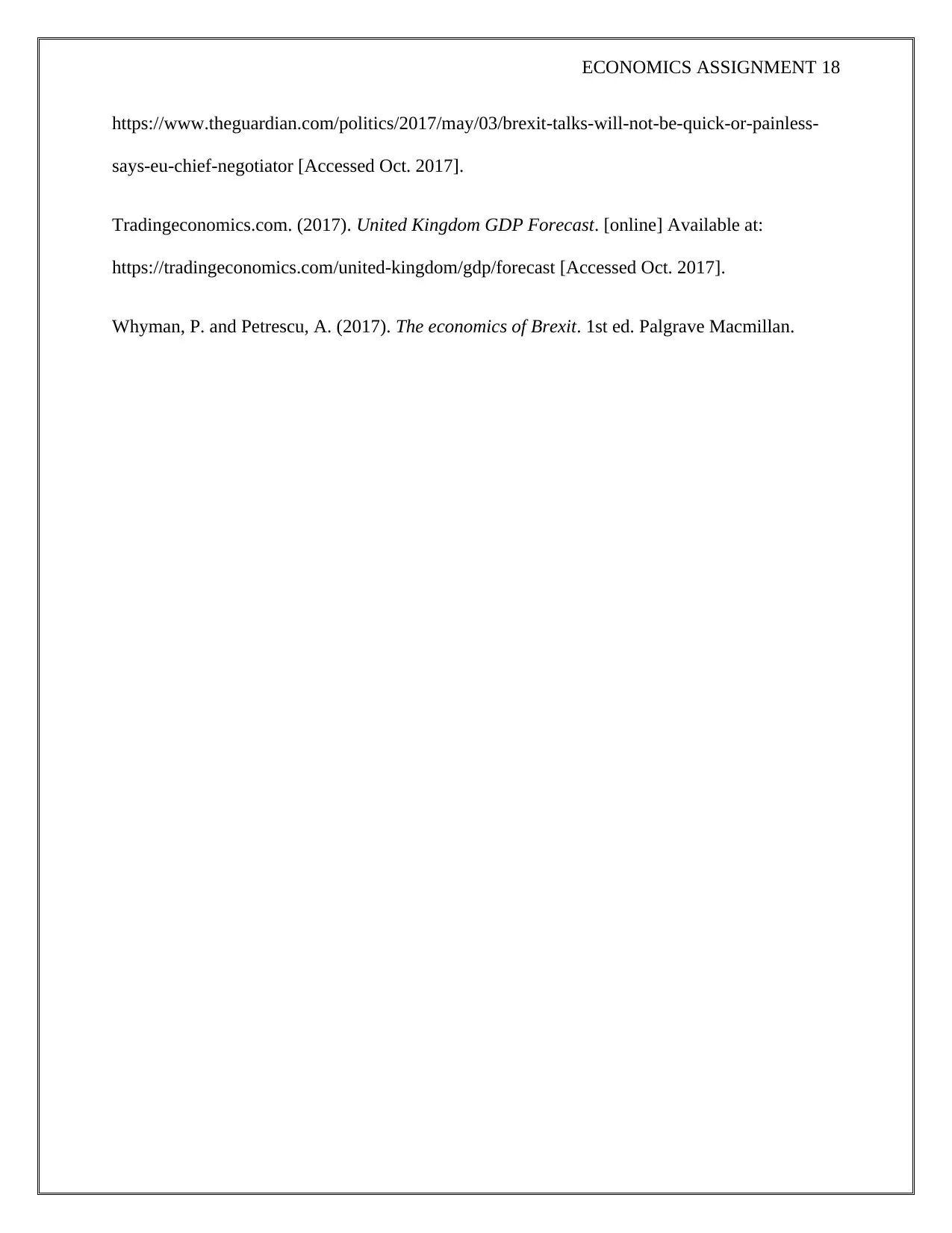
ECONOMICS ASSIGNMENT 18
https://www.theguardian.com/politics/2017/may/03/brexit-talks-will-not-be-quick-or-painless-
says-eu-chief-negotiator [Accessed Oct. 2017].
Tradingeconomics.com. (2017). United Kingdom GDP Forecast. [online] Available at:
https://tradingeconomics.com/united-kingdom/gdp/forecast [Accessed Oct. 2017].
Whyman, P. and Petrescu, A. (2017). The economics of Brexit. 1st ed. Palgrave Macmillan.
https://www.theguardian.com/politics/2017/may/03/brexit-talks-will-not-be-quick-or-painless-
says-eu-chief-negotiator [Accessed Oct. 2017].
Tradingeconomics.com. (2017). United Kingdom GDP Forecast. [online] Available at:
https://tradingeconomics.com/united-kingdom/gdp/forecast [Accessed Oct. 2017].
Whyman, P. and Petrescu, A. (2017). The economics of Brexit. 1st ed. Palgrave Macmillan.
1 out of 18
Related Documents
Your All-in-One AI-Powered Toolkit for Academic Success.
+13062052269
info@desklib.com
Available 24*7 on WhatsApp / Email
![[object Object]](/_next/static/media/star-bottom.7253800d.svg)
Unlock your academic potential
© 2024 | Zucol Services PVT LTD | All rights reserved.





